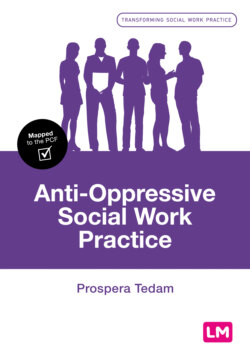Читать книгу Anti-Oppressive Social Work Practice - Prospera Tedam - Страница 18
На сайте Литреса книга снята с продажи.
What can be done about oppression?
ОглавлениеHaving examined what oppression is, we turn our attention to what can be done about oppression and, specifically, what social workers can do to minimise or disrupt oppression in their work with service users. While many social workers understand the impact of oppression in theory, fewer are confident about how their own approach to service users and their families might be oppressive (Shaia, 2019).
Let us begin with a reminder of the global definition of social work:
Social work is a practice-based profession and an academic discipline that promotes social change and development, social cohesion, and the empowerment and liberation of people. Principles of social justice, human rights, collective responsibility and respect for diversities are central to social work. Underpinned by theories of social work, social sciences, humanities and indigenous knowledges, social work engages people and structures to address life challenges and enhance well-being.
(IFSW, 2014)
It is right that the international definition is given prominence in this first chapter, as it contains words and phrases that will be unpicked and examined further in this book. For this chapter, the liberation of people refers to freeing people from oppression, and this aligns with the aims of this chapter and the book. The answer to the question about what can be done about oppression is ‘quite a lot’. However, this will depend on your understanding of oppression, and your ability and willingness to challenge individuals and structures that allow oppression to persist. Challenging individuals and structures will require you, as social workers, to use frameworks, a few of which will be discussed in this book.
According to Yee et al. (2015), a framework for anti-oppressive practice can only be viewed as a practical tool to understand, critique and improve current practices of social work agencies, including exposing the rules, ideas and belief systems that have become embedded within institutional practices (p476). The use of the word ‘tool’ is poignant, and in the context of anti-oppressive practice, it offers social workers a way of working. Essentially, a tool can be used or rejected dependent on who is using it. A tool will only be useful if it is used appropriately. One cannot observe a tool and expect it to work itself; consequently, there must be an active and proactive use of the tool for it to have the potential to yield the desired results. One of these tools is a social justice ally which, according to Griffin (1997, p76), is a member of the agent group who rejects the dominant ideology and takes action against oppression out of a belief that eliminating oppression will benefit agents and targets. An ally will be one who is critically self-reflective and continuously looking for ways to relate favourably with people from varying backgrounds and social locations. Becoming an ally should be viewed as a process and not a one-off event because of the multiple social identities that people have.
We will argue that by default, all social workers should be social justice allies. However, this could be viewed as somewhat simplistic because it is not always easy to take a social justice ally position when organisational and structural barriers exist in practice. It may be that, as social workers, you need to develop tools and strategies to disrupt oppressive policies, guidelines and working practices to ensure that they are adhering to Anderson and Middleton’s (2011) recommendation of being a critical thinker and provocative. Becoming an ally begins with a motivation to protect friends, family members and colleagues from harm. The altruistic ally, according to Edwards (2006), is one who is motivated by guilt to act, whereas the ally for social justice is one who is pushed to act to address the root causes of systemic oppression, regardless of whether they personally know any ‘victims’ of oppression. Thus, whether you are an altruistic or social justice ally, the process of self-development by using one’s privilege to support and advocate on behalf of others is welcome in social work practice.
